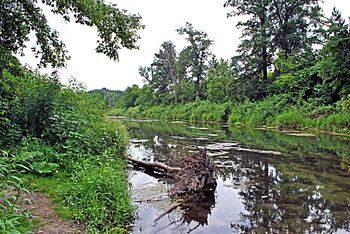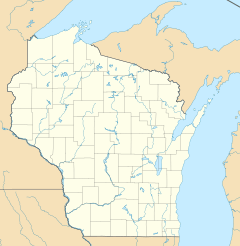Rush River (Wisconsin) facts for kids
Quick facts for kids Rush River |
|
|---|---|

Rush River below WI 29 South
|
|
|
Mouth of the Rush River
|
|
| Country | United States |
| State | Wisconsin |
| County | Pierce County, St. Croix County |
| Physical characteristics | |
| Main source | Emerald 45°00′37″N 92°18′45″W / 45.0102426°N 92.3124119°W |
| River mouth | Maiden Rock 44°33′29″N 92°19′51″W / 44.55806°N 92.33083°W |
| Length | 49.8 mi-long (80.1 km) |
| Basin features | |
| River system | Mississippi River |
The Rush River is a river in western Wisconsin, United States. It is about 49.8-mile-long (80.1 km) (about 80 kilometers) from where it starts to where it ends. The Rush River is a tributary of the Mississippi River. This means it is a smaller river that flows into a larger one.
Contents
About the Rush River
The Rush River begins in St. Croix County, near a town called Baldwin. It flows south through Pierce County. The river eventually empties into Lake Pepin, which is part of the Mississippi River. This meeting point is about one mile west of the village of Maiden Rock. The biggest stream that flows into the Rush River is called Lost Creek.
Towns Along the River
There are three small towns located along the Rush River. These communities are Centerville, Martell, and El Paso.
The River's Journey
When the Rush River first starts, the land around it is quite flat. But soon, the river flows into a deep valley. This valley is typical of an area called the Driftless Area. The Driftless Area is special because it was not flattened by glaciers during the last Ice Age. Here, you can see cool rock formations made of sandstone and limestone.
Fish and Wildlife in the Rush River
The Rush River is famous for its excellent trout fishing. While it might not have as many trout as the nearby Kinnickinnic River, the trout here are often bigger! This is because the Rush River has slightly warmer water in some parts. Warmer water helps produce larger food sources for the trout.
Different Fish in Different Spots
The water temperature also affects what kind of fish live in different parts of the river. For example, upstream from the bridge in Martell, you will mostly find trout. But just south of that bridge, you'll mostly see fish called suckers. The last few miles of the river, closer to the Mississippi, have more fish that like medium-temperature water, like smallmouth bass.
A Special Natural Area
The area where the Rush River meets the Mississippi River is very important. This river delta was named a State Natural Area in 1986. A delta is where a river spreads out into many smaller streams before joining a larger body of water. The land here is heavily wooded and often floods, making it a perfect home for waterfowl (birds that live near water).
 | Percy Lavon Julian |
 | Katherine Johnson |
 | George Washington Carver |
 | Annie Easley |


